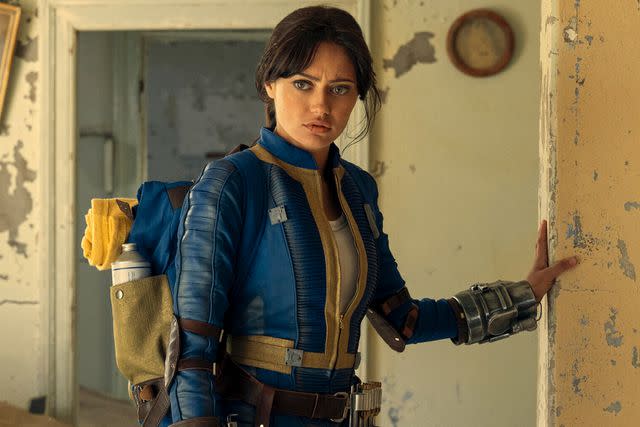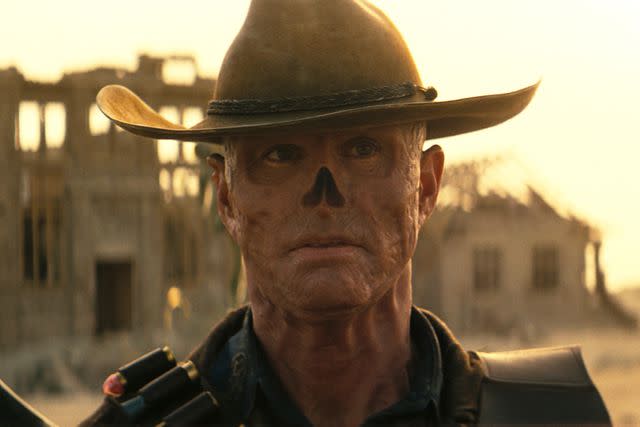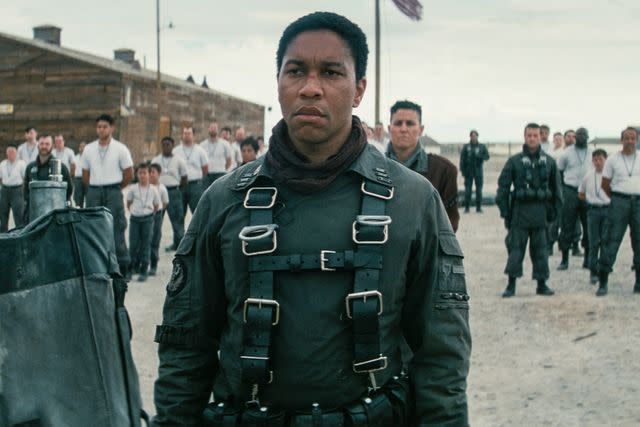“Fallout” review: An addictive post-apocalyptic adventure
- Oops!Something went wrong.Please try again later.
Ella Purnell and Walton Goggins star in Prime Video's adaptation of the blockbuster video game franchise.
In the fourth episode of Fallout, the Ghoul (Walton Goggins) drags his prisoner, Lucy (Ella Purnell), across the sun-bleached, sandy wasteland of post-nuclear-apocalypse California. A zombie-esque former human mutated by radiation, the Ghoul has spent the last 219 years cementing his reputation as the irradiated desert’s deadliest bounty hunter. Lucy is new to the surface world, having been raised in the orderly safety of Vault 33, one of dozens of subterranean communities established by citizens who fled underground before the war began. Self-interest and violence are anathema to her; she even tries to appeal to her captor by reminding him of the Golden Rule. It doesn't work.
While the Ghoul is momentarily distracted, Lucy runs. A struggle ensues, during which Lucy bites off his right index finger and he, in turn, saws hers off with a machete. Holding the bloody digit aloft, the Ghoul gives Lucy a look that almost connotes respect. “Now that right there,” he says, “is the closest thing we’ve had to an honest exchange so far.”
Consider this the guiding principle of Fallout: If a nihilist and an optimist can just learn to communicate, there could be hope for humanity yet. Adapted from the blockbuster video game franchise by Westworld’s Lisa Joy and Jonathan Nolan, this vast apocalyptic adventure interrogates the concept of human survival through a lens of morality and justice. The eight-episode season exists in a vivid and captivating universe that will be familiar to gamers — though knowledge of the franchise isn't required to enjoy its darkly comic dystopian pleasures.

JoJo Whilden/Prime Video
Ella Purnell in 'Fallout'Fallout begins with “The End.” Quite literally: The words flash on screen, all caps, as our welcome. It’s the year 2077 in (alternate reality) America, a place where the culture of the 1950s, with all its Western-loving, “pinko”-hating patriotic gusto, never died. Actor and well-known movie cowboy Cooper Howard (Goggins) is performing at a child’s birthday party in Los Angeles when the bomb drops — the culmination of a 10-year global resource war — decimating much of the life on Earth. Flash forward two centuries. An emergency drives Lucy MacLean, the aforementioned apple-cheeked resident of Vault 33, to the surface seeking answers. There, she must contend with unlimited dangers: Think the Ghoul, giant meat-eating cockroaches, a massive pink lizard-like abomination known as a Gulper, among other horrors.
The Fallout universe, both before and after the Great War, is a place where society is deeply divided — and every group thinks the other is a “cult.” (Sound familiar?) Before the bombs dropped, those who supported America’s fight abroad — and companies like Vault-Tec, which profited from it — were labeled warmongers and evil capitalists. Everyone else? Communists. In the post-war world, Vault dwellers like Lucy are viewed by those on the surface as brainwashed automatons at best, cowards at worst. The wasteland itself is a battleground for dueling factions: There’s the Brotherhood of Steel, a brutal military force that uses “knights” in robotic Power Armor suits to confiscate any and all technology. Others follow Moldaver (the always-welcome Sarita Choudhury), a “madwoman” who presides over a compound of armed acolytes deep in the desert. Both organizations believe they alone know how to save the human race from itself, and both will shed as much blood as it takes to achieve their goals.

Courtesy of Prime Video
Walton Goggins in 'Fallout'Into this morass of cruelty and savagery comes Lucy MacLean, the only person in a thousand-mile radius who believes mankind should work for the greater good. Though the Ghoul taunts Lucy that the wasteland will make her a killer, Fallout allows her a hero’s journey that intertwines the loss of her innocence with the effect of her altruism on others. Specifically, Maximus (Aaron Moten), an orphan-turned-squire in the Brotherhood of Man who’s been beaten down so much by life — and his Brotherhood peers — he views everyone as an opponent to be defeated. As their incongruously sweet romance unfolds, Lucy introduces Maximus to the power of community: “In the vaults, we recognize that we all need each other.”
The mythology is dense. As a non-gamer, I utilized a lot of pre-existing Fallout wikis and explainers created by the online community to fill in some blanks. (What is a Pip-Boy? Why are bottle caps used as currency?) And we haven’t even gotten to Wilzig (Michael Emerson), who works in the behavioral engineering department of a military-run government organization called the Enclave, or Lucy’s brother, Norm (Moisés Arias), who uncovers some ominous secrets about the Vault system after she’s gone.
Despite its Westworld pedigree (Nolan also directs the first three episodes), Fallout has a sense of humor about its characters and the dire situations they endure. Showrunners Geneva Robertson-Dworet (Captain Marvel) and Graham Wagner (Silicon Valley) foster more of a Watchmen vibe, grounding their alternate reality in fundamental truths and juxtaposing the more cartoonish elements with weighty themes, including xenophobia, eugenics, and the corrupting influence of capitalism on governance. (One plea, however, to producers of all prestige apocalypse dramas: It's time to bury "slo-mo battle scenes set to Nat King Cole and Glenn Miller" in a TV time capsule for a century — at least.) Lucy is the audience’s surrogate, but the series doesn’t champion any one ideology. Even the “good guys” have their prejudices. “These people, am I right?” says a Vault overseer, venting about surface dwellers. “If you want to get elected you have to ‘respect their traditions’ and ‘tolerate them’ and ‘not call them surfies.’ It’s awful.”

Courtesy of Prime Video
Aaron Moten in 'Fallout'He’s played by Chris Parnell, one of many wonderful actors — Dallas Goldtooth! Dale Dickey! Matt Berry! — who pop up in Fallout’s expansive ensemble. Goggins, who gave three Emmy-worthy performances last summer (I’m a Virgo, Justified: City Primeval, The Righteous Gemstones), lords over Fallout as the Ghoul, a merciless mercenary with a whiskey-smooth drawl and a devilish grin. Not even layers of burn-scar prosthetics can dampen the actor’s immutable charm. Purnell leavens her character’s perky patriotism with a necessary dash of self-awareness; Lucy may be naïve about the (sometimes hostile) strangers she encounters, but she never begrudges them their humanity. Moten makes Maximus a wonderfully endearing doofus, and Arias brings a mournful cynicism to Norm, who seems to be the only resident of Vault 33 who was born without an inherent sense of purpose.
Usually, the complaint about puzzle box shows is that they withhold too many answers from the viewer. Fallout, by contrast, downloads almost too much information in the season 1 finale. Prime Video, which has no consistent release pattern for its originals, chose to drop all eight episodes of Fallout at once. It's too bad; the show would have benefitted from a weekly rollout, giving fans more time to rewatch, digest, dissect, and debate its intricate story threads. But that's just my opinion. There is, after all, no one right way to handle the end of the world. Grade: B+
All eight episodes of Fallout are streaming now on Prime Video.
Sign up for Entertainment Weekly's free daily newsletter to get breaking TV news, exclusive first looks, recaps, reviews, interviews with your favorite stars, and more.
Related content:
Read the original article on Entertainment Weekly.

